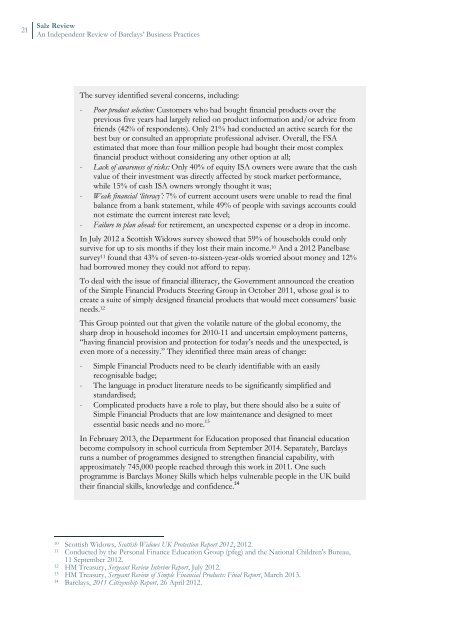Salz Review - Wall Street Journal
Salz Review - Wall Street Journal
Salz Review - Wall Street Journal
You also want an ePaper? Increase the reach of your titles
YUMPU automatically turns print PDFs into web optimized ePapers that Google loves.
21<br />
<strong>Salz</strong> <strong>Review</strong><br />
An Independent <strong>Review</strong> of Barclays’ Business Practices<br />
The survey identified several concerns, including:<br />
- Poor product selection: Customers who had bought financial products over the<br />
previous five years had largely relied on product information and/or advice from<br />
friends (42% of respondents). Only 21% had conducted an active search for the<br />
best buy or consulted an appropriate professional adviser. Overall, the FSA<br />
estimated that more than four million people had bought their most complex<br />
financial product without considering any other option at all;<br />
- Lack of awareness of risks: Only 40% of equity ISA owners were aware that the cash<br />
value of their investment was directly affected by stock market performance,<br />
while 15% of cash ISA owners wrongly thought it was;<br />
- Weak financial ‘literacy’: 7% of current account users were unable to read the final<br />
balance from a bank statement, while 49% of people with savings accounts could<br />
not estimate the current interest rate level;<br />
- Failure to plan ahead: for retirement, an unexpected expense or a drop in income.<br />
In July 2012 a Scottish Widows survey showed that 59% of households could only<br />
survive for up to six months if they lost their main income. 10 And a 2012 Panelbase<br />
survey 11 found that 43% of seven-to-sixteen-year-olds worried about money and 12%<br />
had borrowed money they could not afford to repay.<br />
To deal with the issue of financial illiteracy, the Government announced the creation<br />
of the Simple Financial Products Steering Group in October 2011, whose goal is to<br />
create a suite of simply designed financial products that would meet consumers’ basic<br />
needs. 12<br />
This Group pointed out that given the volatile nature of the global economy, the<br />
sharp drop in household incomes for 2010-11 and uncertain employment patterns,<br />
“having financial provision and protection for today’s needs and the unexpected, is<br />
even more of a necessity.” They identified three main areas of change:<br />
- Simple Financial Products need to be clearly identifiable with an easily<br />
recognisable badge;<br />
- The language in product literature needs to be significantly simplified and<br />
standardised;<br />
- Complicated products have a role to play, but there should also be a suite of<br />
Simple Financial Products that are low maintenance and designed to meet<br />
essential basic needs and no more. 13<br />
In February 2013, the Department for Education proposed that financial education<br />
become compulsory in school curricula from September 2014. Separately, Barclays<br />
runs a number of programmes designed to strengthen financial capability, with<br />
approximately 745,000 people reached through this work in 2011. One such<br />
programme is Barclays Money Skills which helps vulnerable people in the UK build<br />
their financial skills, knowledge and confidence. 14<br />
10 Scottish Widows, Scottish Widows UK Protection Report 2012, 2012.<br />
11 Conducted by the Personal Finance Education Group (pfeg) and the National Children's Bureau,<br />
11 September 2012.<br />
12 HM Treasury, Sergeant <strong>Review</strong> Interim Report, July 2012.<br />
13 HM Treasury, Sergeant <strong>Review</strong> of Simple Financial Products: Final Report, March 2013.<br />
14 Barclays, 2011 Citizenship Report, 26 April 2012.
















